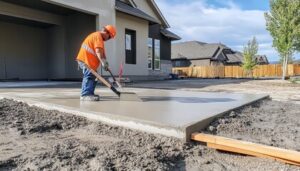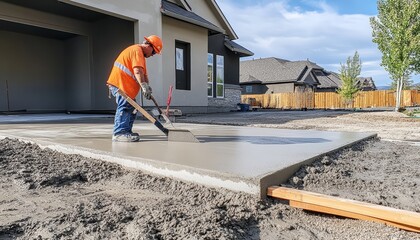Concrete Contractors McKinney TX are skilled professionals who specialize in turning construction projects into a tangible reality. They bring your vision to life through their craftsmanship and dedication.
When looking for a concrete contractor, experience is essential. Contractors with years of experience have dealt with different challenges in the past, and they can use their previous experiences to deliver exceptional quality on your project.
Concrete is one of the most common construction materials, and it’s used in a wide variety of building projects. Concrete Contractors specialize in working with this material to construct exterior parts of buildings, foundations, and other structural components. They work with architects, engineers, and general contractors to ensure that their concrete constructions are in compliance with the project’s design and specifications.
A good Concrete Contractor will have the right tools and equipment to handle the job effectively and efficiently. From mixers to floats and joint cutters, the right tools are crucial to ensure that the concrete is poured, smoothed, and finished properly. Additionally, a good Concrete Contractor will be familiar with the different types of concrete and how they behave under specific conditions.
When choosing a Concrete Contractor, it’s important to consider their communication skills and customer service values. A reliable Concrete Contractor will be able to answer any questions or concerns you may have and provide you with detailed estimates. In addition, they will be willing to follow safety protocols and prioritize the health and safety of their team and clients.
Whether your project is large or small, you’ll want to choose a Concrete Contractor who will take the time to listen and understand your vision. They will be able to provide you with a customized plan and solution that fits your needs and budget. During this process, they will also identify any potential issues and make recommendations on how to avoid them.
In addition to their knowledge of concrete, Concrete Contractors should have a passion for their craft. They should enjoy the challenge of creating something that will last a lifetime and find satisfaction in transforming ideas and blueprints into tangible realities.
In addition, a good Concrete Contractor will always strive to improve their skills and stay up-to-date on new materials and construction techniques. Whether through attending workshops, reading industry publications, or networking with fellow concrete professionals, they will continually seek out opportunities to learn and grow. This will allow them to remain at the forefront of their field and offer their clients the highest quality of service possible.
Attention to Detail
Attention to detail is a skill that can help people excel in a wide range of professions. It involves the ability to focus on the minutiae of a task while also having a clear understanding of its broader context. It’s a critical skill that can increase efficiency, reduce errors, and improve the quality of work. It’s also an important trait for building trust with clients, colleagues, and supervisors.
When choosing a Concrete Contractor, look for one who has an eye for detail and is thorough in their work. They should be able to follow through on the details of their estimates and project timelines, as well as clearly communicate with you about any potential issues that may arise during the course of your project.
Concrete is a complex construction material that requires attention to detail when working with it. A good Concrete Contractor will know how to properly mix, pour, and finish concrete materials to achieve the desired texture and appearance. They will also be aware of any environmental or safety concerns when working with these materials.
Having attention to detail is important for all types of jobs, but it’s particularly crucial in roles that require precision and accuracy. For example, a mistake in a medical setting could have serious consequences for patients. Similarly, a misalignment in an architectural design can have a significant impact on the finished product.
The ability to pay close attention to detail is a soft skill that can be learned and refined over time. It’s important to break tasks into smaller parts, eliminate distractions, and practice focusing on a single aspect of a job for extended periods of time. It’s also a good idea to review your work regularly to ensure that you’re not missing any important details.
A Concrete Contractor with attention to detail is a valued employee who can provide quality work in any industry. They will take the time to understand their customers’ needs and expectations, and they will always deliver high-quality results. They will also be able to respond quickly to any questions or concerns that may arise throughout the course of the project.
Reliability
Concrete contractors have spent years honing their craft, so they know the ins and outs of working with concrete. That means they can complete the job quickly and efficiently, saving you time and money. They can also ensure the job is done correctly the first time around, eliminating costly do-overs.
When choosing a commercial concrete contractor, ask about their project history and client list. This will give you a good idea of their level of experience, but be sure to ask about specific projects that were challenging and how they handled those challenges. A successful case study will demonstrate their ability to adapt and overcome unforeseen obstacles, which is an important quality to look for in a contractor.
One of the best ways to find a reputable concrete contractor is to get referrals from friends and family members who have used their services. This will allow you to compare the experiences of different contractors and choose the one that is right for your project. You can also check online reviews and Better Business Bureau ratings to see what other people have had to say about their experience working with the contractor.
Once you have narrowed down your list of potential concrete contractors, it is important to interview each one. You want to make sure they are licensed, insured, and bonded, which will protect you in the event of any accidents or damage that may occur during construction. In addition, it is a good idea to ask about the contractor’s work history and how long they have been in business.
A professional concrete contractor will be able to provide you with a contract that outlines all of the terms and conditions of the project, including the price. It is important to read the contract carefully and have a lawyer look it over before signing it. Once you have signed the contract, the contractor is legally obligated to perform the work as agreed upon. If the contractor does not perform as promised, you can file a claim with the BBB or your state’s consumer protection agency.
Communication Skills
Concrete Contractors should have strong communication skills to work with clients and other team members effectively. They must be able to convey project details, materials requirements and expectations clearly in order to avoid any misunderstandings that may lead to delays. This communication also ensures that everyone is on the same page, which reduces the likelihood of any unforeseen problems during the construction process.
Professional concrete contractors are usually certified and participate in specialized training programs to enhance their skills. These credentials demonstrate their expertise and can help them build trust with potential clients. They can also provide references from previous customers who can attest to their work quality and communication abilities.
When evaluating concrete contractors, be sure to look for one with a valid license and insurance. This will ensure that they are qualified and reputable, and can be held accountable for their work and safety compliance. In addition, it is important to check their website for customer reviews and ratings. This can give you a broad overview of their reputation and level of satisfaction, and help you make the best decision for your project.
You can also look at the condition of their equipment, as well as the quality of the concrete they use. Make sure that they use high-quality, durable materials to ensure the longevity of your project. Finally, consider whether they are willing to provide you with a detailed quote that includes all costs for the materials and labor. This will help you compare prices and choose the best contractor for your needs. In addition, it is a good idea to request a list of previous projects completed by the contractor you are considering. By doing this, you can get a feel for the contractor’s level of expertise and see how their work matches up with other projects in the area. Finally, be sure to inquire about the project’s time frame and payment schedule. This will help you set up a timeline for when the job will be completed, and make sure that all parties involved are on the same page.



